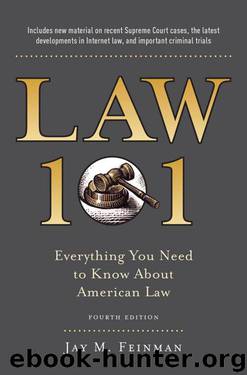Law 101: Everything You Need to Know About American Law, Fourth Edition by Jay Feinman

Author:Jay Feinman [Feinman, Jay]
Language: eng
Format: epub
Publisher: Oxford University Press
Published: 2014-08-01T00:00:00+00:00
When Are Damages Awarded to Punish the Defendant?
The typical tort damages are purely compensatory. They may be burdensome to the defendant, even to the point of bankruptcy, but the measure of damages is the plaintiff’s loss. In extreme cases, however, a different kind of damage is awarded with the sole purpose of punishing the defendant for doing wrong. These are called punitive damages or exemplary damages.
As a matter of law and practice, punitive damages are awarded in only a very small number of cases. The law on punitive damages varies from state to state, but everywhere something more than ordinary negligence or even the typical intentional tort is required before punitive damages can be awarded. The tests are stated in terms such as whether the defendant’s conduct “shocks the conscience,” is “outrageous,” or demonstrates a “reckless indifference” or “willful and wanton disregard” for the safety of the plaintiff. Because of the narrowness of the standard, punitive damages are awarded in only 1 or 2 percent of the tort cases that go to judgment.
Punitive damages, especially large amounts of punitive damages, are most often awarded in commercial cases. A leading U.S. Supreme Court case on punitive damages, for example, involved a false advertising claim by the maker of the popular Leatherman multifunction tool against one of its competitors. Sometimes, though, personal injury cases produce substantial punitive damage awards. Asbestos manufacturers concealed the harmful effects of asbestos for decades and were held accountable through punitive damages in several cases. A jury awarded $10 million in punitive damages to a husband whose wife died of toxic shock syndrome, because Playtex deliberately disregarded studies and medical reports linking superabsorbent tampons and the syndrome at a time when other tampon manufacturers responded to the information by modifying or withdrawing from the market their high-absorbency tampons; the trial judge reduced the award to $1.35 million, and the reduced award was upheld on appeal. A. H. Robins Co. was held liable for $10 million in a Kansas case for “malicious silence” in concealing information about the dangers of its Dalkon Shield contraceptive device.
Punitive damages serve two purposes. As the name suggests, they punish the defendant for its wrongdoing. The law has different means of punishing wrongdoers; the criminal process is the most obvious. Administrative penalties serve a punitive function—such as when the motor vehicles bureau suspends a driver’s license or the Securities and Exchange Commission suspends a stockbroker’s license. But private civil litigation also serves public values, and plaintiffs who seek punitive damages become private prosecutors of the public good. The dangerous or wrongful behavior of defendants who intentionally manufacture dangerous products might not fit within a definition of criminal conduct or come to the attention of the public prosecutor. Punitive damages punish just as criminal penalties do, and the award of damages is a reward and incentive to the injured plaintiff to serve the public good in this way.
The second purpose is to enhance the deterrent effect of tort law. In some cases, the defendant’s conduct is so outrageous that the award of compensatory damages seems insufficient to deter it.
Download
This site does not store any files on its server. We only index and link to content provided by other sites. Please contact the content providers to delete copyright contents if any and email us, we'll remove relevant links or contents immediately.
| Africa | Americas |
| Arctic & Antarctica | Asia |
| Australia & Oceania | Europe |
| Middle East | Russia |
| United States | World |
| Ancient Civilizations | Military |
| Historical Study & Educational Resources |
Cat's cradle by Kurt Vonnegut(13867)
Pimp by Iceberg Slim(12931)
Underground: A Human History of the Worlds Beneath Our Feet by Will Hunt(11256)
4 3 2 1: A Novel by Paul Auster(11049)
The Radium Girls by Kate Moore(10907)
American History Stories, Volume III (Yesterday's Classics) by Pratt Mara L(4825)
Perfect Rhythm by Jae(4621)
Wiseguy by Nicholas Pileggi(4586)
The Fire Next Time by James Baldwin(4342)
Paper Towns by Green John(4169)
A Higher Loyalty: Truth, Lies, and Leadership by James Comey(4032)
Pale Blue Dot by Carl Sagan(4001)
The Mayflower and the Pilgrims' New World by Nathaniel Philbrick(3913)
The Doomsday Machine by Daniel Ellsberg(3731)
Too Much and Not the Mood by Durga Chew-Bose(3694)
Killers of the Flower Moon: The Osage Murders and the Birth of the FBI by David Grann(3609)
The Borden Murders by Sarah Miller(3590)
The Sympathizer by Viet Thanh Nguyen(3479)
Killing England by Bill O'Reilly(3455)
